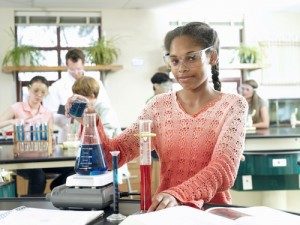If I could accomplish just one thing in my career, it would be to have all leaders take equalizing opportunity to learn seriously. If knowledge equality were a top priority, much would change from early childhood through college.
One thing that would no longer be tolerated is denying access to essential courses. According to a 2014 report from the US Department of Education Office for Civil Rights, “Nationwide, only 50% of high schools offer calculus, and only 63% offer physics…. A quarter of high schools with the highest percentage of black and Latino students do not offer Algebra II; a third of these schools do not offer chemistry.”

Can you imagine sending your child to a school that does not offer chemistry? (Image courtesy of Shutterstock.)
Of those schools offering courses called physics and chemistry, students may not have a real opportunity to learn. As Bill Schmidt has shown, even courses that seem well defined like Algebra I cover very different content.
Now, a new report shows huge disparities in course access in New York City:
Today, 39 percent of the city’s high schools do not offer a standard college-prep curriculum in math and science, that is, algebra 2, physics and chemistry. More than half the schools do not offer a single Advanced Placement course in math and about half do not offer a single Advanced Placement course in science….
Roughly 21 percent of New York City high school students attend schools that don’t offer courses in both chemistry and physics….
Three years of science is a graduation requirement in all city high schools. Students at schools that don’t offer the full complement of college-prep sciences meet that requirement by taking one of these sciences, usually biology—or as it’s known in New York schools, “living environment”—and supplementing that with courses such as forensics or general science.
Replacing biology, chemistry, and physics with living environment, forensics, and general science is an outrage. But no one seems to care. Do they believe the myth that science skills can be developed equally well with chemistry or forensics? Do they care more about engagement than knowledge? Do they think some kids can’t do physics?
Do those who shrug off this outrage not know that the traditional, academic math and science classes are essential for a wide range of occupations? Drawing from the Bureau of Labor Statistics, the report lists courses required for some popular careers:
Accountant: pre-calculus
Architect: pre-calculus, physics
Dental hygienist: biology and chemistry
Electrician: algebra 1
Emergency medical technician: biology, chemistry
HVAC mechanic: physics
Lab technician: chemistry and biology
MRI technician: biology, chemistry, physics
Registered nurse: biology, chemistry
Fortunately, this is a problem that at least some leaders are trying to solve. The Foundation for Excellence in Education highlights 10 districts and charters in seven states that are working to expand course access. Working in rural and urban areas, they are creating new venues for high-quality online, blended, and in-person courses.